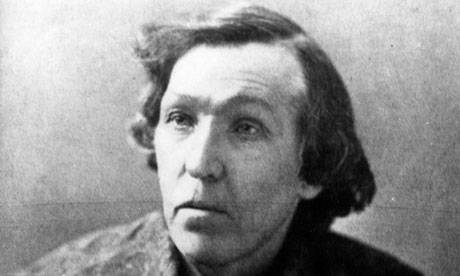
There's news about the bad poet William Topaz McGonagall. It's of absolutely no importance, but of great and goofy enjoyment to many in the English-speaking world. Several poems that have never been published in any book will soon be recited in public for the first time in more than 100 years, and maybe ever.
McGonagall, born in Edinburgh, lived much of his life in Dundee, by the river Tay. His most famous poem is called The Tay Bridge Disaster. One cannot help but try to admire the opening lines:
"Beautiful Railway Bridge of the Silv'ryTay!
Alas! I am very sorry to say
That ninety lives have been takenaway
On the last Sabbath day of 1879,
Which will be remember'd for a verylong time."
McGonagall fashioned other poems of comparable quality and worth. Many of them praise cities (The Beautiful City of Perth), towns (Beautiful North Berwick), villages (Beautiful Monikie), products (Sunlight Soap) or people (Lines in Praise of Mr J Graham Henderson, Hawick) that the poet hoped would be moved to give him money. Audiences often chose, instead, to pelt him with peas.
Scotland must take credit for producing – at almost the same moment – two of the world's most persistent bad poets.
In 1828, three years after McGonagall was born, the town of Forres welcomed a newborn named James McIntyre. McIntyre moved to Canada, where he milked, churned and ripened the poems that eventually got him known as The Cheese Poet. McIntyre's most famous is called Ode on the Mammoth Cheese – Weight over seven thousand pounds. It begins:
"We have seen thee, queen of cheese,
Lying quietly at your ease,
Gently fanned by evening breeze,
Thy fair form no flies dare seize."
McIntyre produced many other poems of comparable quality and importance, among them: Hints to Cheese Makers; Fertile Lands and Mammoth Cheese; and Prophecy of a Ten Ton Cheese. He died in 1906, again following McGonagall by a very few years.
The neglected McGonagall poems will be revealed on 19 March at the University of Dundee. Steve Farrar, who researches and writes materials for Scottish historic sites, recently happened upon them. Norman Watson, author of a new book called Poet McGonagall: The Biography of William McGonagall, also will take part in the Dundee ceremony. At evening's end, all will rise, and together declaim the concluding lines of The Tay Bridge Disaster.
That will be the highlight of the final event of this year's Ig Nobel Tour of the UK, from 13-19 March.
A month later, at the Edinburgh Science Festival, the other poems will be given their modern premiere, followed by a walk to Greyfriars Kirkyard, where McGonagall is buried. His nearest neighbour, for eternity, is Walter Geike (1735-1837).
A plaque next to McGonagall's explains that Geike is deaf.
• Marc Abrahams is editor of the bimonthly Annals of Improbable Research and organiser of the Ig Nobel prize For information about the Ig Nobel Tour of the UK go to http://improbable.com/improbable-research-shows/ig-uk-tour

